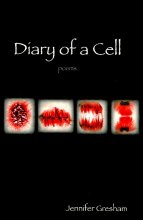

Review of Diary of a Cell
| The cover of Jennifer Gresham’s Diary of a Cell shows a
cell, one of the “beautiful, dividing sacks / of water and code,”
dividing. This sets up an expectation for readers — we want to glimpse
the art in the science, to experience for ourselves the elegance of transformation.
As A. R. Ammons says in the anthology Verse & Universe: Poems
about Science and Mathematics, “it is wonderful how things
work: I will tell you about it because it is interesting.”
A scientific framework can reveal beauty visible under a microscope, and
the language of science is rich with metaphoric potential. The diary in
the title poem is |
“… always written in code;
a whole library
of nothing more
than four letters strung together,
a tongue-twister
even if
you know the language.”
“It’s an injustice that only neuro-doctors get to say these words” says Thomas Lux, in Verse and Universe. Gresham, a biochemist, knows what she knows and we trust the voice. “…Jennifer Gresham lays a sharply focused lens of language on the surface of experience, to learn, as she says in “Anatomy,” “the secrets of the deep,” Michael Collier notes. The solemnity of the situation—students’ first experience with a cadaver — does not overwhelm the poem’s music or its images.
“We did not expect a young woman
… her nose a mountain on the plain
of her face, her neck and arms
thin as dried reeds”
Gresham begins.
“Awestruck, the Latin rose to our lips
like a sigh: the graceful length
of her gracilis, her shapely gluteus medius,
the sweep of the orbicularis oris
beneath her stiff, unsmiling lips.”
The technical words don’t exclude us; in fact, they protect against emotional excess.
Gresham’s exploratory, precise point-of-view powers not only the science poems but the philosophical ones as well. Many of the lyrical narratives grapple with big questions, and we gain entry into the poems from many angles: “Model of an Atom” compares Schrodinger’s creative work to obsessive love; in “To End All Wars,” we meet Oppenheimer,
“…eyes full of ash, the rising
sun eclipsed. How hollow
are the refrains of discovery
when one has become death,
destroyer of worlds.”
With her command of poetic device, imagery and sound in particular, Gresham goes beyond the surface of the poems, adding layers of meaning. The following piece recalls Einstein’s dream, and wears its erudition lightly. It opens up new insights with charm and accessibility; it wants to be read aloud.
Explaining Relativity to the Cat
Imagine, if you will, three mice.
Contrary to what you have
heard, they are not blind
but are in a spaceship
traveling near the speed of light.
This makes them unavailable
for your supper, yes.
So these mice, traveling near
the speed of light, appear
quite fat, though there is
no cheese aboard. This is
simply a distortion of mass,
because the mass of a mouse
is nothing more than a bundle
of light, and vice versa. I see
how this might imply mice
are in the light fixtures,
undoubtedly a problem, so
let me try again.
If two people attempted
to feed you simultaneously,
no doubt a good situation,
but you were on a train
traveling near the speed
of light, the food would
appear unappetizing, falling
to the plate in slow motion,
an extended glob of protein
that never smelled good,
if you ask me, train or no.
The affinity of the food
for the plate, what we call
gravity, is really just
a stretch in the fabric
of a space-time continuum,
what happens when you
have sat in a seat too long,
perhaps on this very train.
Oh kitty, I know how you hate
to travel and the journey must
have made you tired. Come now,
lick your coat one more time
and let us make haste
from this strange city
of light and fantastic dream.
In several of the poems, Gresham’s sense of humor is much in evidence.
Consider the dieter in “Empty Calories,” a nephew’s
“Booger,” the joyous “A Scientist’s Acrostic”
(“…Scientists are like beetles
Crawling over the earth,
antennae twitching...”). “Love in Nerdville” tells the
story of one couple with this characterization — “She was the lemon,
he the copper wire.” Gresham often couples exuberance with restraint
in her examination of how it feels to be alive in a way that brings to
mind Stephen Dunn.
I’ll leave you with the poem that closes the collection. It’s
one of my favorites. I like it for its tenderness and the way it shows
how the waking mind can influence realities that give rise to our nightmares.
As Charles Harper Webb says in his introduction, Diary of a Cell
is poetic, “not in a namby-pamby, sensitive-soul-in-an-insenstive-world
way; in the strong and competent sense of poietes:maker.”
Another Imagined Infidelity
Sometimes I wake up
at three in the morning,
wounded: a temptress running
her fingers down your arm
at a dinner party, you in bed
with my best friend from childhood.
Every now and then, you hit
a new low. This time,
an exotic woman was lost
and called our number by mistake.
You guided her through
unfamiliar territory out of kindness,
your voice terribly calm.
We have been married too long
for this. When I rouse you
from sleep to detail your crimes,
you groggily humor me. Why
does this one count against me?
Because I, too, was lost once,
and you are still the landmark I cling to.
Diary of a Cell won the 2004 Steel Toe Books Prize in Poetry. Three of the poems from the book were read by Garrison Keillor on his radio program, The Writer’s Almanac. The book is available from Amazon.com, Steel Toe Books, and Gresham’s website, Litmus Poetry.
Previously published in The Alsop Review.









